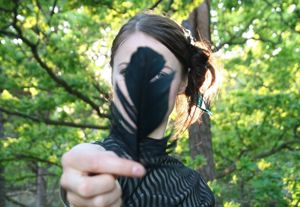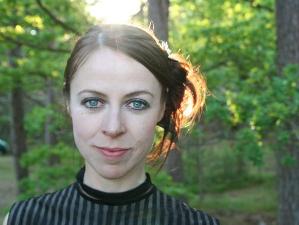
It’s a swelteringly hot afternoon at Haldern festival. People lounge under the trees We have a interview with Wendy McNeill, whose sinister, charming songs have somehow wormed their way into Incendiary’s consciousness over the last two years. McNeill is a friendly, chatty woman, though you get the feeling she can’t be doing with a lot of the bullshit that envelops the business she’s in. We started off by asking Wendy about Haldern itself.
WM: I think it’s really special. I think Roskilde has this similar, special vibe as well, because you’ve got the beach, and you have your sun cream & swimsuit, and the demographic is similar in terms of the people the two festivals attract, but Haldern has a real love vibe!
IN: There’s something in the German psyche where they actively like hanging out together in big groups… and Haldern accentuates this, you’re right it has an old fashioned hippy vibe
WM: It’s all for the force of good! That explained all the naked people coming out of the lake then?
IN: Patti Smith skinny dipped in the lake when she played here a few years ago.
WM: (Laughs)
IN: I’d better ask some questions… We loved Dreamer’s Guide to Hardcore Living, we were intrigued by your approach, especially when we watched you play live. You have a very open way of making songs, you like people to be involved with what you do, but you sing about subjects that aren’t really cuddly; subjects like shape shifting and death..
WM: I always think that… (long pause) …if you have a dark thing to say, a good melody and a little bit of humour makes it much more palatable (laughs). It means that if you plummet down further then you don’t make people feel so… I don’t know… down?
IN: Do you think your stuff is that scary?
WM: No; I don’t think it’s any more scary than reading a newspaper… no I think it’s more easy when you’re playing live, because you are communicating with the audience and you’re feeding off them and giving back and it is an inspiring process, regardless of the song’s subject. I mean the gig just now in that tent (Wendy refers to her performance in the Spiegel Tent) the energy was the thing that kept me going because I’m pretty jetlagged (laughs). That’s what drives everything I do in my music.
IN: Do you work elemental forces into your music? You don’t have a pre-determined plan when you play?
WM: No. I have a set-list which I don’t always follow, I did today (laughs) but really it depends what the mood of the audience is. If I’m playing solo then I really don’t follow anything I just look at the audience and watch the gestures of the audience. But with a band you have to be a bit more diligent with what you’re doing. As far as other forces goes, I don’t really want to bang on too much about it here, but I definitely believe that there’s a lot of stuff going on that people don’t see or are even aware of. And I like to communicate with that.
IN: I always thing there’s a magical reality, like Max Beckmann said. To change tack, what is it with animals? You mention animals a lot in your music.
WM: It’s because I spent too much time alone as a child. I mean, seriously, animals were my very best friends. I moved around a lot and… I mean I just had really special animals. I had a hamster that lived for so many years, and a couple of rabbits that were special to me. We would bond and that informed my childhood, yep.
IN: You have lots of songs about dogs. There are a lot of stories about dogs and ghosts, and the underworld: Black Dog, Fenris, Cerberus and all…
WM: I’m definitely a dog lover and I’d say I’m a bit of dog in me as well. I have lots of friends who are “cat people” and they have the characteristics of cats, all very refined and existential (laughs) and I’m all smiles, waggy tails and a big heart. Maybe that’s what I’m tapping into, myself (laughs again).
IN: You’re Canadian, yet you moved to Sweden: two cold countries…
WM: I think Sweden’s a definite step up. I come from a very cold area where it’s like minus 40 in winter and you frieze to death so Sweden is a piece of cake.
IN: Don’t you go nuts with all the darkness?
WM: I’ve been very fortunate with the winter months, in that I’m normally on tour, in Brazil for example: and last year we were in India. I try to get away.
IN: I’ve got lots of personal links with Norway. It’s strange how the climate affects people, in summer they go mental.
WM: But I love that though, don’t you? I love it when you can sit out all night and it may be minus two, but you’re still in a restaurant. Oh, I love that because it informs my music. I’ve been in places where it’s been too hot and I can’t find the inspiration for music, it’s all too lethargic. And I like places to have weather changes I think living in a place where the weather didn’t change would drive me a bit crazy.

IN: Your music draws on a lot of folk and Klezmer stylings…
WM: I’m very sponge-like when it comes to this kind of thing. I’m absorbing things and sometimes they dictate where I want to go. At first I used to have a feel for French things, Musette, especially on the album before this one, and I eventually moved away from that and started hearing different things. I “blame” a lot of my new ideas on buskers, because they base a lot of their music on foot-stomping rhythms which you can’t really beat. I didn’t really make a conscious choice to change styles, I’m a water sign and we don’t do things consciously (laughs) but a lot of this started to seep into my music.
(Pauses) But music has so many purposes as an art form, because what you create is what you create, period: especially on record. Dance I reckon is the worst one in terms of what you have to show: you spend years in rehearsal and then you have a run of what, a few months, maybe weeks? And then the original concept is over, never to be created in the same form again. Which is a drag. Music has a chance of survival, you’ve got the poetry of the melody, and that big fusion between the lyrics and the music, and you can get that down on tape exactly as it was, so the magic is there.
IN: And it is disposable, which is music’s great strength. When you try to create a visual art-form that is disposable it always comes across as if the artist is conning the public.
WM: I guess that’s why music wins out for me because it has that extra dimension, performance.
IN: Is that what you like to do most?
WM: When it’s good, yeah, definitely. When you’re dealing with people that are down, you can have a hard experience, but when it’s right, it’s the best.
IN: You say you are influenced by lots of music but we’ve only talked about buskers and Musette. What other music do you like?
WM: Some classical, odd things, a lot of Swedish bands like Thus: Owls. I like sparse stuff, I like stuff with a lot of space.
